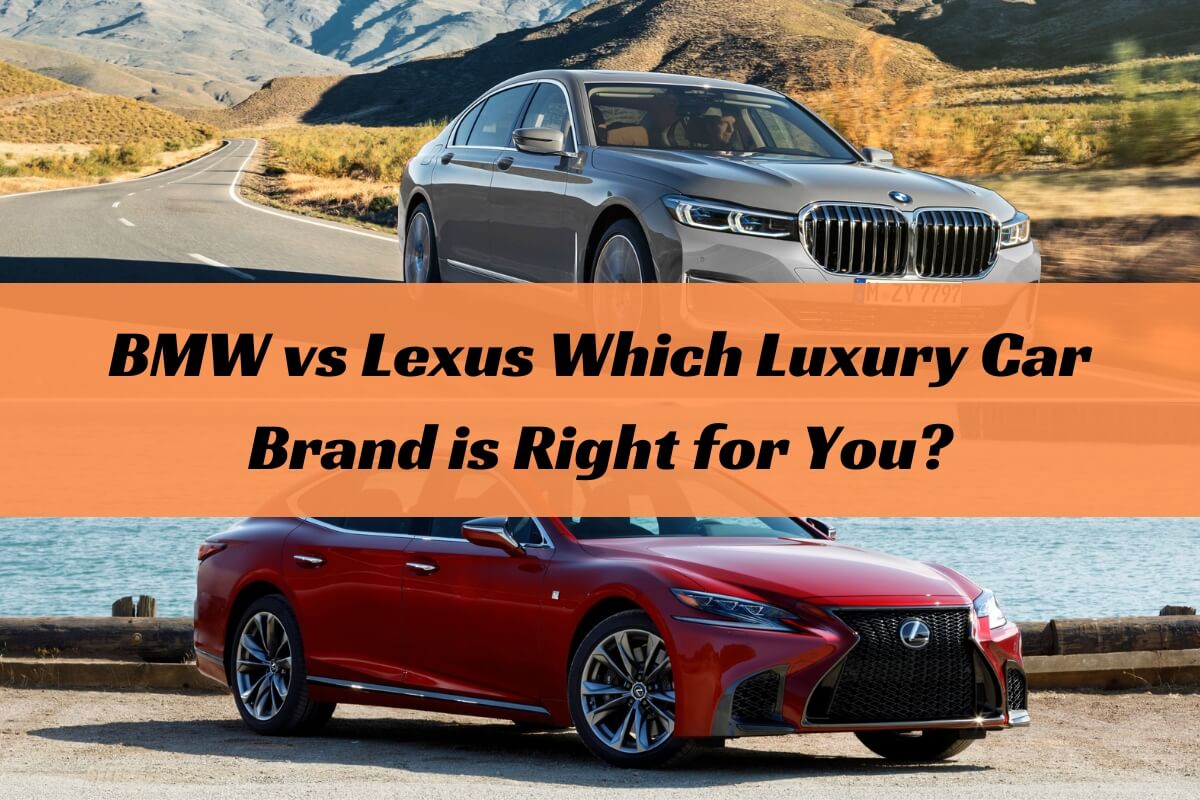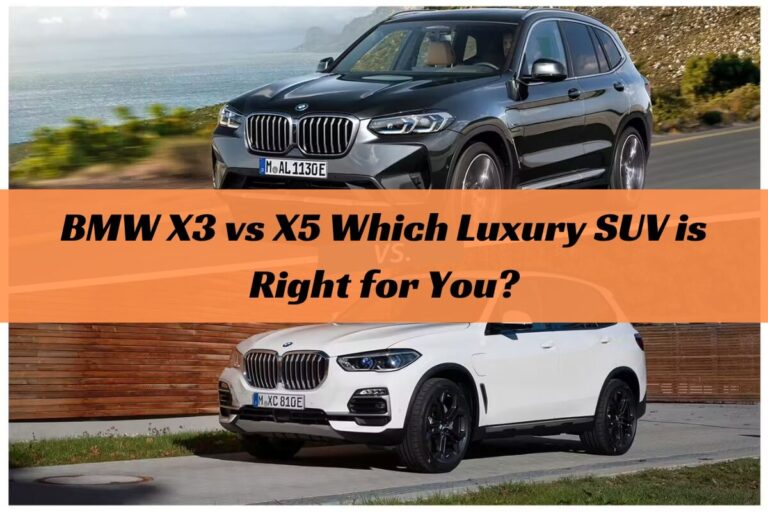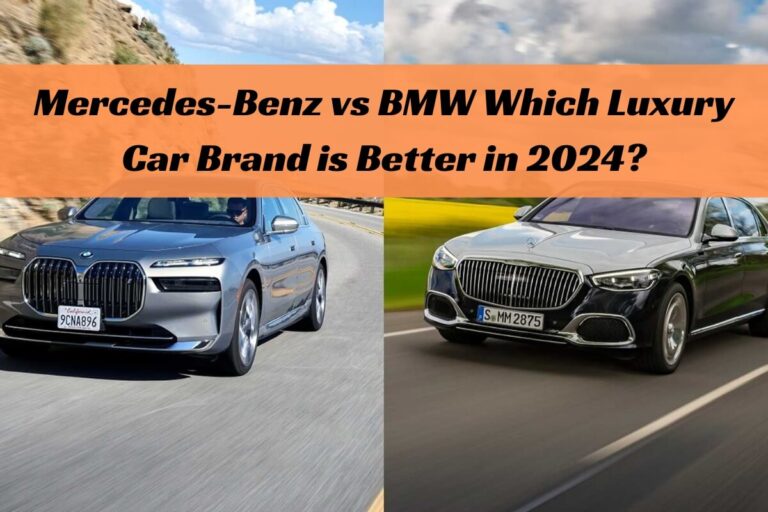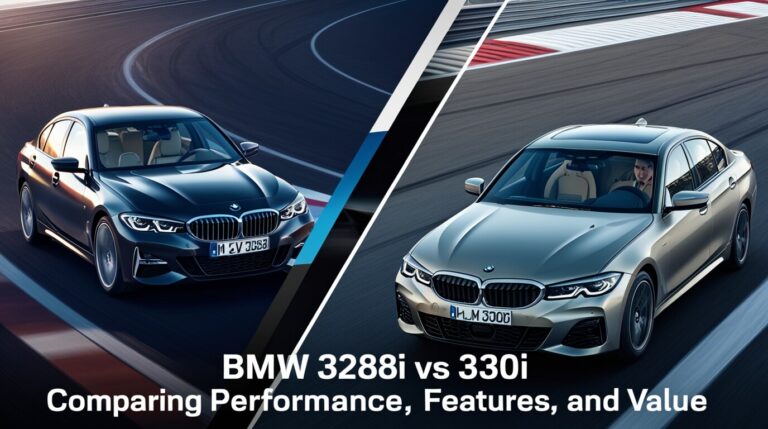
Luxury cars represent the pinnacle of automotive engineering, combining breathtaking performance with premium comfort and cutting-edge technology. When it comes to prestigious luxury brands, few names carry as much weight as BMW and Lexus. These automotive giants have built reputations for crafting vehicles that epitomize luxury, power, and sophisticated design.
However, as you set out to purchase your next luxury vehicle, one question looms large: Which brand, BMW or Lexus, is the better choice for you?
The short answer is: It depends on your priorities. BMW is the ideal pick if you value thrilling performance and an engaging driving experience above all else. But if top-notch reliability, lower ownership costs, and a focus on comfort are more important, then Lexus may be the better luxury car brand for you.
In this comprehensive guide, we’ll dive deep into the key differences between BMW and Lexus. We’ll compare them across vital factors like pricing, reliability ratings, performance capabilities, safety features, interior amenities, and more. By the end, you’ll have a clear understanding of each brand’s strengths and weaknesses, allowing you to make an informed decision aligned with your preferences and lifestyle.
What’s the Difference in Pricing Between BMW and Lexus?
One of the first considerations for any luxury car buyer is cost. Both BMW and Lexus offer a range of models at varying price points, but there are some notable differences in their pricing strategies.
On average, BMWs tend to have higher starting prices compared to their Lexus counterparts. For example, the popular BMW 3 Series sedan starts around $41,000, while the comparable Lexus IS has a base price of around $39,000. This price gap widens as you move up the model lineups.
The BMW X5 midsize luxury SUV kicks off at approximately $60,000, whereas the Lexus RX SUV begins in the low $45,000 range. However, it’s worth noting that higher trim levels and additional options can quickly inflate the final sticker price for both brands.
When it comes to long-term ownership costs, Lexus tends to have an advantage. According to data from RepairPal, the average annual repair cost for a Lexus is around $551, while BMWs average $968 per year. This difference can add up significantly over the vehicle’s lifetime.
Moreover, Lexus models generally have better resale values compared to BMWs. Kelley Blue Book consistently ranks Lexus among the top brands for resale value, while BMWs tend to depreciate faster.
In terms of warranties, both brands offer similar basic coverage, with a 4-year/50,000-mile new vehicle warranty. However, Lexus provides a 6-year/70,000-mile powertrain warranty, while BMW’s powertrain coverage ends at 4 years/50,000 miles.
Which Brand is More Reliable – BMW or Lexus?
Reliability is a crucial factor when investing in a luxury vehicle. After all, you want your high-end car to provide a hassle-free ownership experience. In this regard, Lexus has a clear edge over BMW.
J.D. Power’s Vehicle Dependability Study consistently ranks Lexus among the top brands for long-term reliability. In fact, Lexus has topped the study for ten out of the last twelve years, including the most recent 2023 edition.
On the other hand, BMW’s reliability ratings have been more inconsistent. The brand has scored below the industry average in recent J.D. Power dependability studies, indicating a higher likelihood of problems as vehicles age.
Consumer Reports’ reliability data tells a similar story. Lexus models frequently earn top ratings for predicted reliability, while BMWs often score below average, particularly in the first few years of ownership.
Common reliability issues reported for BMWs include problems with electrical systems, engine cooling systems, and fuel pumps. In contrast, Lexus owners tend to experience fewer significant issues, contributing to the brand’s stellar reputation for dependability.
How Do BMW and Lexus Vehicles Perform?
Engine Options and Power Ratings
Both BMW and Lexus offer a wide range of engine options across their lineups, catering to different performance needs.
BMW is known for its powerful and engaging powertrains, often favoring turbocharged engines. Their lineup includes everything from fuel-efficient four-cylinder options to high-performance V8 and even V12 engines in their top-tier models.
For instance, the BMW M5 Competition packs a 4.4-liter twin-turbo V8 that churns out an impressive 617 horsepower and 553 lb-ft of torque. Even the entry-level BMW 330i comes equipped with a punchy 2.0-liter turbocharged four-cylinder producing 255 horsepower.
Lexus, on the other hand, has traditionally focused on smooth, naturally aspirated engines, although they’ve recently embraced turbocharging as well. Their powertrains are often tuned for a balance of power and efficiency, catering to a more luxury-oriented driving experience.
The Lexus LC 500, for example, features a 5.0-liter naturally aspirated V8 that generates 471 horsepower and 398 lb-ft of torque. The Lexus IS 350 sports a 3.5-liter V6 with 311 horsepower, while the NX 350h hybrid SUV combines a 2.5-liter four-cylinder engine with electric motors for a total system output of 239 horsepower.
Acceleration and Performance
When it comes to outright acceleration and performance, BMW typically has the edge over Lexus. BMWs are renowned for their spirited driving dynamics and athletic handling, thanks to their rear-wheel-drive architecture and finely-tuned suspension systems.
For instance, the BMW M3 Competition can sprint from 0 to 60 mph in a blistering 3.8 seconds, while the Lexus IS 500 F Sport takes a more leisurely 4.4 seconds for the same sprint.
However, it’s worth noting that Lexus has been working to close the performance gap with its F Sport models, which feature sportier tuning and more aggressive styling.
Fuel Efficiency
In terms of fuel efficiency, both brands offer a range of options, from thrifty four-cylinder engines to gas-guzzling high-performance models.
Generally speaking, Lexus vehicles tend to have a slight advantage in fuel economy, thanks to their focus on efficiency and widespread adoption of hybrid powertrains.
For example, the Lexus RX 450h hybrid SUV achieves an EPA-estimated 31 mpg combined, while the BMW X5 xDrive40i manages only 24 mpg combined with its turbocharged six-cylinder engine.
That said, BMW has made strides in improving efficiency with technologies like brake energy regeneration and stop-start systems, helping some of their models achieve respectable fuel economy ratings.
What About Safety Ratings and Driver Assistance Tech?
Safety is a paramount concern for luxury car buyers, and both BMW and Lexus have earned impressive safety ratings from organizations like the National Highway Traffic Safety Administration (NHTSA) and the Insurance Institute for Highway Safety (IIHS).
Most BMW and Lexus models earn top scores in crash tests, thanks to their sturdy construction and advanced safety features.
Speaking of safety features, both brands offer a comprehensive suite of driver assistance technologies, although the specifics may vary between models and trim levels.
Standard safety features on BMWs typically include forward collision warning, automatic emergency braking, blind-spot monitoring, and lane departure warning. Optional tech like adaptive cruise control, head-up display, and surround-view cameras are also available.
Lexus, on the other hand, bundles many advanced safety features under its Lexus Safety System+ umbrella. This includes technologies like pre-collision braking, lane tracing assist, automatic high beams, and road sign recognition.
Some higher-end Lexus models also offer semi-autonomous driving capabilities through systems like Lexus CoDrive, which combines adaptive cruise control and lane-keeping assist for enhanced convenience on highways.
While both brands prioritize safety, Lexus has consistently scored better in independent safety ratings from organizations like the IIHS, which could be a deciding factor for some buyers.
Interior Luxury: BMW vs Lexus Cabins
Stepping inside a luxury vehicle, you expect a certain level of opulence and comfort, and both BMW and Lexus deliver on this front, albeit with slightly different philosophies.
BMW interiors are often lauded for their driver-focused design and sporty aesthetics. High-quality materials like leather and premium soft-touch surfaces are used throughout, but the overall ambiance leans more toward a performance-oriented feel.
The brand’s iDrive infotainment system, controlled via a rotary knob or touchscreen, is highly intuitive and feature-rich, offering seamless connectivity and a wealth of customization options. BMWs also tend to have supportive, well-bolstered seats that provide excellent comfort during spirited driving.
In contrast, Lexus cabins prioritize a more serene, luxurious atmosphere. The brand’s designers place a strong emphasis on meticulous craftsmanship, utilizing premium materials like semi-aniline leather and real wood trim to create an inviting, upscale ambiance.
While the Lexus infotainment system may not be as cutting-edge as iDrive, it is generally straightforward and easy to use. One standout feature is the available Mark Levinson audio system, which provides a concert-like sound experience for audiophiles.
Both brands offer ample passenger space and cargo room, but Lexus models often have a slight advantage in terms of overall interior volume, particularly in their SUV and crossover offerings.
When it comes to interior amenities, BMW and Lexus models are generously equipped, even at the base level. Standard features typically include power-adjustable seats, dual-zone automatic climate control, and smartphone integration via Apple CarPlay and Android Auto.
However, as you move up the trim levels, the luxury amenities become more lavish. Options like heated and ventilated seats, premium audio systems, panoramic sunroofs, and massaging functions elevate the luxury experience further.
Which Models are the Best in Each Lineup?
With their diverse range of vehicles, both BMW and Lexus offer compelling options across various segments. Here’s a closer look at some of the standout models from each brand:
Top Sedans: BMW 3 Series vs. Lexus IS
In the compact luxury sedan category, the BMW 3 Series and Lexus IS are fierce rivals. The 3 Series is renowned for its balanced performance and engaging driving dynamics, while the IS offers a compelling blend of luxury, comfort, and value.
While the 3 Series may have an edge in outright performance, the IS counters with exceptional reliability and a more spacious interior, making it a strong contender for buyers prioritizing practicality.
Midsize Luxury: BMW 5 Series vs. Lexus ES
Moving up to the midsize luxury segment, the BMW 5 Series and Lexus ES represent the flagship sedan offerings from their respective brands.
The 5 Series is a true driver’s car, with a range of potent engines and a well-tuned chassis that delivers an exhilarating driving experience. It also boasts a tech-laden interior and a plethora of advanced safety features.
The Lexus ES, on the other hand, is more focused on providing a serene, comfortable ride, making it an excellent choice for buyers seeking a luxurious daily driver. It also offers a hybrid powertrain option for improved fuel efficiency.
SUV Comparison: BMW X5 vs. Lexus RX
In the highly competitive luxury SUV market, the BMW X5 and Lexus RX are two of the most popular choices.
The X5 delivers a dynamic driving experience, thanks to its powerful engine options and well-tuned suspension. It also offers a spacious, premium interior and a long list of advanced tech features.
The Lexus RX counters with its legendary reliability, a plush and quiet cabin, and a choice of hybrid powertrains for improved efficiency. It may not be as engaging to drive as the X5, but it excels in providing a comfortable, hassle-free luxury SUV experience.
High-Performance Models: M Series vs. F Sport
For those seeking ultimate performance from their luxury vehicles, both BMW and Lexus offer high-performance variants – the BMW M Series and Lexus F Sport models, respectively.
BMW’s M division is legendary in the automotive world, producing some of the most capable and exhilarating performance machines on the market. From the iconic M3 and M5 sedans to the thunderous X5 M and X6 M SUVs, these vehicles are purpose-built for driving enthusiasts.
Lexus’ F Sport models, while not quite as extreme as their BMW M counterparts, still deliver a healthy dose of performance and driving excitement. The RC F and GS F, for instance, offer potent naturally aspirated V8 engines and sport-tuned suspensions, providing a more engaging driving experience than standard Lexus models.
Owner Satisfaction and Brand Loyalty
Beyond the technical specifications and feature lists, owner satisfaction and brand loyalty are crucial factors that can influence a car buyer’s decision.
According to J.D. Power’s customer satisfaction studies, Lexus consistently ranks among the top luxury brands, often outperforming BMW. This reflects Lexus’ commitment to delivering a hassle-free ownership experience and exceptional customer service.
Brand perception and loyalty also play a role. BMW has long been associated with driving pleasure and performance, attracting buyers who prioritize those attributes. On the other hand, Lexus is often viewed as a more reliable, comfortable, and value-oriented luxury brand, appealing to buyers seeking a more serene, trouble-free ownership experience.
Interestingly, Lexus owners tend to exhibit higher levels of brand loyalty compared to BMW owners, according to various industry studies. This could be attributed to Lexus’ strong reputation for reliability and customer satisfaction, as well as the perceived value proposition offered by the brand.
FAQ on Buying a BMW or Lexus
Is maintenance more expensive for BMW?
Generally, yes. BMWs tend to have higher maintenance and repair costs compared to Lexus vehicles. This is partly due to the complexity of BMW’s performance-oriented engineering and the higher cost of parts and labor associated with the brand.
Do Lexus cars retain value better than BMW?
Lexus vehicles are known for their exceptional resale values, often outperforming BMWs in this regard. This can be attributed to the brand’s reputation for reliability and quality, as well as the lower maintenance costs associated with Lexus ownership.
Which brand makes better performance cars?
If pure performance is your top priority, BMW has a clear advantage over Lexus. BMWs are designed with a stronger emphasis on driving dynamics, handling, and outright speed, making them the preferred choice for enthusiasts seeking an exhilarating driving experience.
Are BMWs or Lexus more fun to drive?
BMWs are widely regarded as being more engaging and fun to drive than their Lexus counterparts. The brand’s focus on performance and dynamic handling characteristics translates into a more involving driving experience, particularly on winding roads or during spirited driving.
In summary,
While both BMW and Lexus are exceptional luxury car brands, the choice between them comes down to your personal priorities and preferences. If you value thrilling performance, engaging driving dynamics, and a more athletic demeanor, BMW might be the better fit. However, if you prioritize top-notch reliability, lower ownership costs, and a serene luxury experience, Lexus could be the more suitable choice.
Ultimately, carefully evaluating your needs, test-driving both brands, and understanding their respective strengths and weaknesses will help you make the most informed decision when purchasing your next luxury vehicle.






